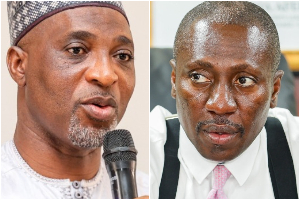Is there such a thing as being over-qualified for any position of responsibility? Experts recommend that ideally a candidate must prepare a different CV for every position they apply for. In the same way that no two different words mean exactly the same thing in many languages, no two jobs would require the same CV. Well, maybe it is appropriate that it is only the ideal thing to do; it happens that most people are not looking for ideal jobs in this century; people want jobs that pay better and also give them more time to go looking for other jobs, even if that other job means doing nothing. Otherwise, why would a Cambridge Physics professor wake up one fine day and decide that he wants to be a plumber? Would he state on his CV that he has a PhD in Physics when he is applying for a job in plumbing? He would prefer to dwell more on his plumbing experience in the first half of his CV, and if space permits, say a few things about his educational attainments in the dieing pages. It may give him some credibility. In any case, who is interested in hiring a PhD fellow for a plumbing job?
Well, you will be surprised to know that a lot of people would prefer engaging a scholar of a plumber to a college dropout who took up plumbing for obvious reasons. But how would anybody spot the PhD plumber if he doesn’t say who he is on his CV? It is important to say who you are and what you have on your CV. The problem, very often, is where and how to put it. When the first part of this piece was published, a gentleman in Australia wrote a nicely worded mail to me to, imploring me to vet his CV and make any necessary recommendations. I wrote back to him that a conversation with a butcher would only make sense if the subject rested on livers and kidneys, and that I had no expert knowledge on what constitutes a good CV. He requested my CV, which I readily sent. You see, thieves are always in each other’s thinking and they complete one another’s thoughts all the time. He wrote back to me that he likes the way I have arranged the information on my CV, and that he would like to borrow a few things from it. What he didn’t know was that I had already started cloning a different hybrid of a CV based on how he had bullet-pointed his work experience and other things on his very fine CV. In the end, my CV was merely a twin brother of his’. We have become good friends, and I am looking forward to his visit to London next month. Imagine what we can do together if we combine our brains to set up a 419 agency.
There is always the tendency to steal and lie on a CV. If a man can afford to use a friend’s CV as a template and simply fill in his details without telling God, what prevents him from borrowing his job experience and maybe his date of birth? So, the practice is that we keep updating our CVs, not with new information on work experience or educational attainments, but with strategic discoveries of new formats and other aesthetic details. I am yet to find out what experts think of a CV printed on a pink or green paper. Folks say it makes it unique and easily noticeable among a sea of CVs that usually drown employers at the publication of a vacancy. What about the rather unusual practice of scanning a passport photo of your beautiful face on the CV? I would try that trick only when I don’t want to attend the interview, because I am certain that the interviewer would collapse and foam at the mouth at the sight of my photograph. If you were applying for a modeling job, it would make sense to add photos. In my line of business, good looks are serious disincentives, because very few narcissists make good writers. You could be as ugly as a compressed lump condensed in a boil, or smell like fermented menstrual blood, and still churn out good stuff. The wife of Plato was said to have remarked to her husband: “Don’t you think our children would be great if they combine your intelligence with my beauty?” Plato replied: “What if they take after your stupidity and my ugly face?
You may not need to put a Bible by your side when preparing your CV. It may be difficult to get a good job if you stick religiously to some of the things enumerated in the book of Corinthians. But employers recognize that we are in the dispensation of Grace, where good deeds are not enough to make Heaven. So, you may be permitted to read your Bible and still make a few inventions on your CV, hoping that the days of Ananias and Saphira (By the way, why are modern parents not naming their children after these two?) will not visit you on the interview day. As laughable as it sounds, the best way to avoid lying on your CV is to be honest. A postgraduate Diploma is not a Master’s degree. You don’t have a First Class degree in Law if you missed the mark by a digit. Do you realize that a digit is all it takes to make a woman pregnant, especially in winter? When folks assume that you have a Master’s degree because you went back to university after your first degree, be bold enough to correct them. A police officer who underwent a postgraduate diploma course was mistakenly issued with a Master’s degree, and he was Ghanaian enough to have taken it back. Today, his son, Alfred Arthur, has the privilege of playing with the Sword that was presented to him for being an excellent officer. Even though these days there are Viagra and Alomo Bitters everywhere, you could still be a good Joseph in the face of a thousand sexy Mrs. Potiphars.
Honesty is an important thing in any human endeavour. No matter how much you can falsify achievements on your CV, that piece of document is representative of you than the people those claims really befit. Chances are that if you have to refer to your CV to remember the things you have written in it, then you may have borrowed a few things from Adam. Obviously, you were born before you grew old enough to acquire the impressive work experience you have so admirably sold in your CV. So, which of the two are we likely to forget: where we have worked and what we did, or when we were born? Yet, while it is possible for some of us to forget what we did at some of the places we worked, nobody ever forgets their date of birth. Hang on; these days, people do forget their date of birth, because it may have seen a downward adjustment on occasion without number. Perhaps, it is only in the case of the Nigerian Speaker of Parliament, who had to increase his age to land the speaker job, that we had an instance when somebody had upwardly adjusted his age. He faked everything, including his height.
Talking of age, is it necessary to state your age on your CV? Unless otherwise required, as in the case of some very big jobs, you may not need to mention when and where you were born. You may also not need to state your nationality, even if you are an immigrant in the West. By all means, you would avoid clichés and idiomatic expressions in your CV. A CV that contains typos is as good as the libido of an adulterous nymphomaniac. You would have to read over your CV any time you send it to an employer. It is customary to say what you really are in the preamble, just after your name and address. That preamble should not be an essay. It is an instant put off if it travels more than five lines. Note that the facts in the preamble must be succinctly captured and couched (tightly) in very ‘impressive’ but unambiguous language. It is a personal profile of a sort, so don’t be scared to use a personal pronoun. I came across a statement like this: “Two years experience in marketing communications and a year’s experience as head of a retail banking unit. Have provided consultancy services for a large portfolio of clientele, including Unilever, Nestle Ghana and a number of Non-Governmental organizations.” When your computer draws a green line under an expression, don’t take it as an additional colour required to form a super rainbow; it means the statement is sick, and ought to seen to. My Australian friend had something like this: “I profess knowledge in a variety of professional spheres and have the intellectual curiosity necessary for excelling in online research, administration and project management. I have gained appreciable international exposure through various postings abroad and my association with international bodies, such as the UN and the WTO.” Perhaps, it may appear a bit boastful, but at least, he has conveniently avoided those overbearing superlatives.
“I am a very conscientious and resourceful person…” The little English girl I met in Birmingham asked: “who will say otherwise, tell us how those qualities may have helped you or your employer.” What do employers want to hear? It looks as if as if they would be interested in a good lie than the painful truth. When a candidate is asked whether they have experience in the kind of job they have applied for, it is as if they simply want you to answer in the affirmative. If you say ‘no’, you would have a hell of trouble justifying why you applied in the first place and how you intend to contribute to productivity with nothing in your blockhead. If Lee McQueen, the Apprentice winner, had told the truth about his qualifications, he may not have been invited for the preliminary interview. The job market is very competitive, and despite the fuss we make about falling standards and the absence of scholarship in the modern graduate, employers are still impressed with Oxbridge degrees than a diploma in catering from Kimbu Sec-Tech.
Even if you are not a born-again Christian or a good Muslim, it will still do you a lot of good to be truthful about the claims you make in your CV. Haven’t you ever wished that an earthquake shook the office where an interview is being held, so that the ordeal will end? Those interviews last as long as eternity and are as punishing as hell. Sometimes, you wish you could open up and confess that you don’t really want the job, but it as if the sky has fallen on you; questions roll from every angle. And if you are unlucky to meet sugar-daddies on an interview panel, they instantly see you as the reason why the poco-darlings are not warming up to their bot-bellies. They will tear you apart. When you perform badly at interviews, you normally expect to hear bad news from the employer. So when you receive a job offer, you wonder whether employers are honest people.
To win at interviews, you would need to approach them with the athlete’s Five P mantra: Proper Preparation Prevents Poor Performance. When I demanded a CV from a 28 year old amateur guitarist who wanted to marry my sister, he thought I was referring to a paper that contained his achievements and work history; what I wanted from him was a statement on how he has prepared for the vicissitudes of marriage. As it turned out, he didn’t even have a physical CV, let alone an idea on how to earn income as a guitarist. Benjamin Tawiah: The author is a freelance journalist; he lives in London
Email: btawiah@hotmail.com, quesiquesi@hotmail.co.uk
Opinions of Monday, 23 June 2008
Columnist: Tawiah, Benjamin














